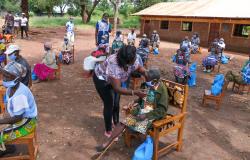Local Understandings of Zoonotic disease should be built into Epidemic Preparedness and Response

People in many global regions can make complex trade-offs between the risk of contracting disease and the need to support their livelihoods, particularly in situations of poverty. Interventions to promote epidemic preparedness should therefore be sensitive to local contexts. These should incorporate knowledge within communities to ensure more effective zoonotic disease surveillance and control, while appreciating broader local priorities for health and well-being.
This article is part of the series “Rethinking zoonoses, the environment and epidemics in Africa”, which examines the effect of changing relationships between human, animal and environmental health on epidemic risk.
As global institutions such as the World Health Organization (WHO) double down on efforts to control the ongoing COVID-19 pandemic, and orient to rethinking preparedness for future events, a strong focus on vaccines and surveillance is evident. Areas where conditions encourage close interactions between humans and animals are considered “hotspots”, where there is potential “risky” contact between species and the transfer of pathogens by “spillover”.
Standard interventions to reduce the transmission from animals to humans have consequently focused on the human-animal interface: avian influenza saw the culling of poultry flocks; Ebola in West Africa drew attention to human-bat interactions; COVID-19 has seen a spotlight again on wild animal markets. In keeping with the focus of conventional preparedness strategies on identifiable risks, interactions between people, livestock and wildlife are assessed within a risk framework. Drivers of disease transmission such as climate change, deforestation, encroachment upon wildlife habitats, urban growth and low biosecurity on farms have been identified as salient for wider policy responses.
However, purely technical approaches to surveillance, early detection and risk reduction can belie the complexity of contexts and of relations between humans, animals and their environments. These are dynamic and characterised by multiple uncertainties. On the ground, such relations are shaped by socio-cultural, religious, livelihood and economic factors, but these perspectives are often ignored in policy related to pandemic preparedness and zoonotic disease control.
The gap between policy interventions and understanding local contexts
Our research highlights the importance of appreciating the realities of local contexts and the complex trade-offs that people make between disease risk and livelihood factors, particularly in situations of poverty. People’s own understandings of priority threats to health and well-being might differ from the views of those designing interventions. Changes in behaviour related to farming, hunting or marketing practices might be constrained by wider structural realities and the precarities of subsistence livelihoods. Interventions that do not take account of these realities can reinforce deep social and economic inequalities and perpetuate unequal health outcomes.
Local knowledge of patterns of disease and vulnerabilities can provide valuable information. Considering local understanding of zoonotic diseases and the conditions associated with their emergence can assist in attuning interventions to address disease outbreaks to different contextual realities and, therefore, increase the likelihood that these are proportionate, socially just and considerate to vulnerabilities and social inequalities.
Gaining a perspective on local understandings and priorities requires a commitment to interdisciplinary research – unfortunately still rare. Research on zoonotic disease often occurs in disciplinary silos, inadequate for a full analysis of problems and the development of effective and acceptable interventions. Our Dynamic Drivers of Disease in Africa programme (2011-16) serves as an example of interdisciplinary research involving ecologists, epidemiologists, zoologists, disease modellers and social scientists. In addition, participatory methods that engaged local people in identifying disease patterns, manifestations and solutions through “participatory modelling” enabled the inclusion of such perspectives in recommendations for interventions.
Our work highlights that debates related to zoonotic disease can all too often centre on professional and bureaucratic concerns. Meanwhile, those actually living with disease in poor and marginal areas have little or no say in the particular interests prioritised, or how they are studied. Commonly, local people and their leadership are considered insufficiently knowledgeable to engage in scientific debates on the issues that might affect them. However, they can provide vital information, including knowledge unavailable anywhere else, and this requires greater recognition in designing research and policy.
Using local understandings to mitigate spillover
Our fieldwork in this programme demonstrated the importance of local perspectives for gaining understandings of changes in human-ecological-disease relations. For example, our study of Lassa fever in Sierra Leone worked with local understandings to identify who is at risk, when and where, and how this is changing. These considerations are useful for mitigating spillover threats.
For instance, Mastomys rodents inhabit bush fallows. When these are burned in the dry season, they are pushed towards dry season gardens in peri-village swamps and into village areas. The shortening of fallows, coupled with a rise in gardening by women as a source of independent income, is changing disease risk levels, with women gardeners particularly vulnerable. This could help explain a higher incidence of Lassa fever in humans during the dry season, when hospital admissions are also higher; however, participatory modelling also revealed a range of reasons why people did not present at hospital during the rainy season, such as flooded roads and a poorer financial situation. Local understandings and reactions to disease can therefore assist in ensuring accurate timings of preparedness and response.
Attention to community understandings and knowledge is thus crucial to ensure more effective zoonotic disease surveillance and control – the first point for strengthening epidemic preparedness and response. Indeed, we contend that a commitment to learning from local level experiences and responses to threats to health should be an important principle for epidemic preparedness and response overall. If diseases with epidemic potential spread more widely through established human to human transmission, as happened with the COVID-19 pandemic, attention to community level perspectives is similarly vital.
This became evident during the West African Ebola outbreak from 2013-16, where the biomedical, disease-focused response initially clashed with villagers’ more socially and ecologically integrated understandings of health and approaches to care. “Safe burials” led by external teams, focused on biomedical infection control, often disrupted key aspects of care and funerals that villagers viewed as essential to ensure that the deceased becomes a good ancestor or to avoid societal disaster. Through respectful dialogue that enabled people to adapt safe burials to balance infection risk and social needs, disease transmission was reduced.
In our research on pandemic preparedness in Africa, we have also analysed how people in rural Uganda and Sierra Leone negotiated public health restrictions related to COVID-19 in 2020, at a time of very low case levels in the fieldwork villages. They mobilised to navigate intersecting precarities, responding to market closures, restrictions on getting to their fields and violent enforcement (in Uganda), while also dealing with food price rises, floods and other health threats.
The establishment of a new unit in the WHO focused on “community readiness and resilience” seems a timely recognition of the value of local level perspectives, although it is important to add that longstanding structural inequalities can undermine response efforts. As the focus shifts to learning from COVID-19 for future preparedness, attention to systems strengthening is more crucial than ever, alongside a consideration of local level experiences, in order to detect and respond to (re)emerging pathogens more effectively. Epidemic preparedness and response need to go beyond technical approaches to predict and control the risk of disease. An appreciation of multiple uncertainties and complex dynamics is crucial, including how people understand and respond to them in the midst of everyday precarities and competing priorities for well-being.
Hayley MacGregor trained as a medical doctor at the University of Cape Town and completed her PhD in Social Anthropology at the University of Cambridge. Her research interests include emerging infectious diseases and pandemic preparedness. She is a Research Fellow at the Institute of Development Studies and a Professor of Medical Anthropology and Global Health. She retains clinical registration with the General Medical Council of the UK and the Health Professions Council of South Africa, with an honorary contract in clinical psychiatry.
Melissa Leach is Director of the Institute of Development Studies. She co-founded and co-directed the ESRC STEPS (Social, Technological and Environmental Pathways to Sustainability) Centre. As a social anthropologist she carried out long-term ethnographic fieldwork in West Africa. She has led several interdisciplinary, policy-engaged programmes in Africa and beyond on epidemics, zoonoses and One Health including the Dynamic Drivers of Disease in Africa Consortium and the award-winning Ebola Response Anthropology Platform, and is currently co-leading the Pandemic Preparedness Project and the Social Science in Humanitarian Action Platform.
Catherine Grant has worked as a researcher at the Institute of Development Studies for over a decade, and has a particular interest in medical anthropology and infectious diseases. Currently she is working on the Pandemic Preparedness Project which focuses on Africa. Recent research includes being part of the Dynamic Drivers of Disease in Africa Consortium and the Ebola Response Anthropology Platform. Prior to working at IDS she worked in several international development organisations, managed an NHS research department and monitored clinical trials. Catherine has worked in several African countries.
This first appeared on Africa at LSE.
Photo by Denis Ngai


